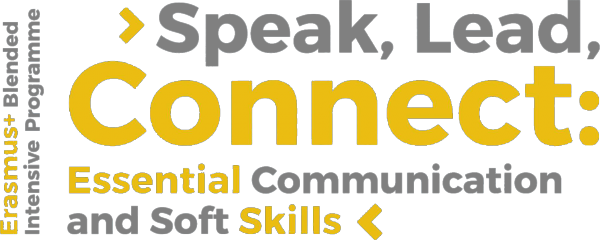
This blended intensive programme focuses on communication and soft skills. It is designed to prepare participants for professional success in diverse and multicultural environments. Through a blend of interactive workshops, practical activities, and reflective discussions, participants develop essential skills for effective communication, collaboration, and leadership.
The program begins with an exploration of cultural differences and their impact on communication styles, using activities such as case studies, roleplays, and icebreakers to enhance understanding of professional English and strategies for addressing cross-cultural miscommunication. Participants then focus on refining their professional communication skills, including writing emails and reports, conducting interviews, and engaging in team discussions, with an emphasis on clarity, cultural appropriateness, and actionable feedback.
Teamwork and leadership take center stage as participants engage in collaborative challenges, decision-making simulations, and discussions on leadership styles across cultures. Public speaking techniques and conflict resolution strategies are also covered, with opportunities for participants to practice delivering speeches, manage difficult conversations, and address workplace disagreements with cultural sensitivity.
The course concludes with a focus on networking, crafting elevator pitches, and presenting on topics that integrate the week’s lessons. Detailed feedback throughout the program ensures participants leave with polished communication skills and greater confidence in navigating professional and multicultural contexts.
| BIP TITLE | Speak, Lead, Connect: Essential Communication and Soft Skills |
| BIP code | 2024-1-HR01-KA131-HED-000200509-1 |
| Lead Instructor / BIP Coordinator | Assistant Professor Dragana Božić Lenard, PhD e-mail: dragana.bozic@ferit.hr |
| Contact hours | 75 face-to-face + 15 online |
| Dates for physical component | October 6-10, 2025 |
| Dates for virtual component | October 27-29, 2025 |
| ECTS credits | 3 |
| Target audience | Undergraduate and graduate students, (non)academic staff |
| Prerequisites | English language B1-B2 proficiency level |
| Websites for information | https://www.ferit.unios.hr/international-cooperation/blended-intensive-programmes https://wikis.ec.europa.eu/display/NAITDOC/Blended+Intensive+Programmes |
| Application procedure | APPLY / ENTER APPLICATION FORM |
Host University:
Josip Juraj Strossmayer University of Osijek – HR OSIJEK01
Host Faculty:
Faculty of Electrical Engineering, Computer Science and IT Osijek - FERIT
Partner Universities:
"1 Decembrie 1918" University of Alba Iulia, Romania, RO ALBAIU01
Technical University of Varna, Bulgaria, BG VARNA02
Practical info:
Student center school Bus directions_bus Train train Social events group
Understand and adapt to cultural differences
• identify how cultural differences influence communication styles and professional interactions
• apply strategies to navigate and mitigate cross-cultural miscommunication effectively
Develop professional communication skills
• write clear, concise, and culturally appropriate professional emails and reports
• communicate confidently in professional settings such as interviews, client meetings, and team discussions
Enhance teamwork and collaboration
• demonstrate effective collaboration strategies in multicultural teams
• analyze teamwork dynamics and apply techniques to foster inclusive and productive group interactions
Strengthen leadership and decision-making abilities
• identify leadership styles and adapt them to diverse cultural contexts
• apply decision-making techniques to solve workplace challenges collaboratively
Master public speaking and conflict resolution
• deliver well-structured and engaging speeches tailored to a professional audience
• handle difficult conversations and resolve workplace conflicts with cultural awareness and sensitivity
Build networking and presentation skills
• craft and deliver effective elevator pitches tailored to professional goals
• present ideas clearly and persuasively, incorporating feedback to refine delivery and content
Reflect on personal growth and skill development
• evaluate their communication and soft skills progress throughout the course
• develop a personalized action plan for applying these skills in real-world professional contexts

Kneza Trpimira 2B, HR-31000 Osijek | Cara Hadrijana 10b, HR-31000 Osijek Tel: +385 (0) 31 224-600 | Fax: +385 (0) 31 224-605
IBAN: HR19 2390 0011 1000 16777, HPB | OIB: 95494259952 | PDV id. / VAT id.: HR95494259952 © 2021 FERIT | ferit@ferit.hr